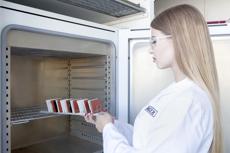WACKER is unveiling its addition-curing solid silicone rubbers for the plastics-processing industry at this year’s German Rubber Conference DKT. One of WACKER’s DKT highlights is ELASTOSIL® R plus 4001, a highly versatile silicone now also available with either an extremely hard or extremely soft Shore A value. Two new hardness grades will premiere at DKT.
Another highlight is ELASTOSIL® R plus 4350/55, a heat-resistant high consistency silicone rubber. Thanks to heat stabilisers, it can endure temperatures up to 300 °C, without a substantial impact on its elasticity or mechanical properties. This year’s DKT takes place in Nuremberg from July 2 to 5.
ELASTOSIL® R plus 4001 is an addition-curing solid silicone rubber with two outstanding features: ease of processing and excellent elasticity. ELASTOSIL® R plus 4001 cures up to 50 percent faster than comparable peroxide-curing rubbers, allowing processors to achieve short cycle times and high production throughputs.
What’s more, cured ELASTOSIL® R plus 4001 products have good mechanical properties. Elastic and considerably deformable, they also retain their mechanical properties for many years. Post-cured molded parts are suitable for manufacturing membranes and seals for various industries and purposes, including sensitive applications in the food industry.
The high consistency silicone rubber ELASTOSIL® R plus 4001 already includes products of varying elasticity and hardness with grades ranging between 30 and 80 Shore A. WACKER has now developed further hardness grades. At this year’s DKT in Nuremberg, WACKER is unveiling products at both the upper and lower end of the Shore A scale, making these new grades suitable for very specific applications. With a Shore A hardness of 20, ELASTOSIL® R plus 4001/20 complements WACKER’s existing range of extremely soft and low-modulus silicone rubbers. This grade has an elongation at break of 1200 percent. In other words, products cured from ELASTOSIL® R plus 4001/20 can be stretched up to twelve times their original length without tearing and without losing their mechanical properties.
The second grade making its DKT debut is at exactly the opposite end of the hardness range. ELASTOSIL® R plus 4001/90 has a Shore A hardness of 90, which is very similar to that of a thermoset. Yet this solid silicone rubber has an elongation at break of 140 percent, making it comparatively elastic, flexible and ductile. The cured silicone is suitable for sensitive applications which means that ELASTOSIL® R plus 4001/90 can also be used in food application sectors.

ELASTOSIL® R plus 4350/55
ELASTOSIL® R plus 4350/55 is a silicone rubber for formulating heat-resistant, addition-curing silicone elastomers. This silicone grade reveals its properties to optimum effect in combination with heat stabilizers. The type of stabilizer and the amount used have a significant influence on the heat resistance of the cured rubber, which is easy to process in extruders.
ELASTOSIL® R plus 4350/55 can therefore be used to make extremely heat-resistant tubing and sealing profiles. They withstand temperatures of up to 300 °C without damage, even for several days. Heat-aging tests show that key mechanical properties such as Shore A hardness and elongation at break change very little at temperatures above 200 °C even after as many as 2,000 hours.
After it has cured, ELASTOSIL® R plus 4350/55 achieves a Shore A hardness value of 55 and is ideal for manufacturing heat-resistant profile gaskets, such as for oven and stove doors or for engine-compartment parts. Postcured grades comply with the requirements of the German Federal Institute for Risk Assessment (BfR) and the US Federal Drug Administration (FDA) for food contact.














